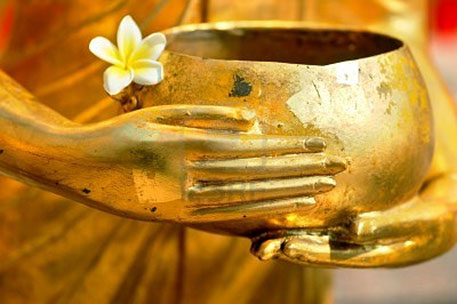 Dana, or Generosity is one of the cornerstones of Buddhist teaching and of the practice of Vipassana meditation. Along with Sila, Morality, it is both a pre-requisite and grounds for training, in so far as we develop these during our practice. Without the support of these two factors it is not possible to develop right concentration, and hence the wisdom that leads to liberation; they go hand in hand with each other, and as we grow in wisdom and in our understanding of the Dhamma, so too does the wish to develop these qualities grow spontaneously in us. As with Metta and the other Brahma-Viharas, they are innate to human beings who have exercised right effort in the cultivation of mind, rather than abandoning themselves to their more basic instincts related to the mental defilements.
Dana, or Generosity is one of the cornerstones of Buddhist teaching and of the practice of Vipassana meditation. Along with Sila, Morality, it is both a pre-requisite and grounds for training, in so far as we develop these during our practice. Without the support of these two factors it is not possible to develop right concentration, and hence the wisdom that leads to liberation; they go hand in hand with each other, and as we grow in wisdom and in our understanding of the Dhamma, so too does the wish to develop these qualities grow spontaneously in us. As with Metta and the other Brahma-Viharas, they are innate to human beings who have exercised right effort in the cultivation of mind, rather than abandoning themselves to their more basic instincts related to the mental defilements.
As our practice deepens, and we recognize and understand the true nature of phenomena, gratitude arises, and allowing ourselves to express this gratitude is an important part of the Dhamma. The gift of the Dhamma is greater than all other gifts, and becoming aware of having received so great a gift, we are desirous that others too may avail of its benefit. We make available our time and our resources so others can practice and develop these qualities, and perhaps then we even extend this generosity into other areas of our life and into society. But let us restrict ourselves for a moment to a meditation center such as Pian dei Ciliegi. A center for meditation would not survive if it weren’t for dana because there is so much work to be done, and it would not make sense to speak here of hired personnel and retributions, since we are not talking about a company that provides a service.
When you come to do a retreat, you do not simply avail of a service, and the sum that you pay as society members serves only to cover expenses: the cost of maintaining the house, the cost of food, secretarial expenses, travel expenses for the teachers, the cost for the diffusion of the teachings, recompense for the staff etc. Certainly what you pay would not be enough if it weren’t for a great deal of volunteer work, and the generosity of those who make donations. The quota to participate in a retreat is kept as low as possible to permit the greatest number of people to participate, and so serves also to cover the costs of those who cannot afford to pay. Even if in our society we are used to valuing things on the basis of their price, here it is not like this: here there is no profit motive; you do not estimate the value of a retreat by how much you pay for it, because you are not “paying” for it, since, as we said, the Dhamma is priceless.
To make a donation is to help the center continue with its activity; participating in the development of the center and of the Sangha, and in the diffusion of the teachings goes beyond a simple act of generosity; it is the recognition of the value of what is being offered and an expression of gratitude. Often we are asked how much one should give. There is no right answer to this question. It is a question of listening to one’s own heart and giving on the basis of ones’ own proper possibility. Knowing how to express gratitude, allowing oneself to express gratitude, is to put to the test one’s capacity for letting go. Seeing our own resistance to being separated from what we possesses, and then letting go: generosity generates wholesome kamma. Even if a donation to the center may be made at any time, the best moment to express recognition and gratitude toward the teachers in the first place, and towards the center that has made such an event possible, is certainly at the end of each retreat.
It is worth bearing in mind that the monks who have dedicated themselves to the spiritual life and to the transmission of spiritual values are sustained by the lay community, but for lay teachers it is a different matter. They are not affiliated to any monastery that looks after their basic needs, and even though they have the same necessities as everyone else, they do not have a stable income, and live off the dana they receive thanks to the teachings they impart. Their lives are just as much dedicated to the study of the Dhamma and to the practice, and their transmission of it is an act of profound generosity. It is up to us then to recognize this situation and to adequately sustain these teachers, that they may be able to continue their work with a certain degree of comfort, keeping in mind too that the teachings cannot and should not be made payable. The lay community must shoulder the responsibility.
In conclusion we would like to emphasize this fundamental principle:
Feeling gratitude – Allowing ourselves to express it – Putting our resistance to the test – and Letting go of what we have.
